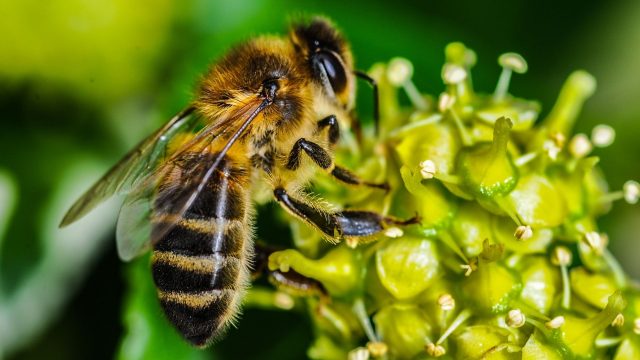16
Feb
Review Provides New Insight into How Pesticide Exposure Disrupts Bee Gut Microbiome

(Beyond Pesticides, February 16, 2022) Pesticide exposure disturbs the gut microbiome of social bees, leading to a range of alterations that could affect fitness in the wild, finds a major literature review recently published by researchers at the University of Ottawa, Canada. With research on bee gut microbiomes is still in its infancy, the review provides a centralized overview of data collected to date, and highlights areas for further research to fill in remaining knowledge gaps. “Social bees have gut microbiotas that contribute to their health, just like we (humans) do,” said Michelle Hotchkiss, a PhD candidate in the Faculty of Science at the University of Ottawa. “Further research on the interactions between pesticides, bee gut microbiotas, and bee hosts will help us better understand how pesticides affect bee health and performance.”
To conduct their review, scientists collected research relating to bee gut over the last 50 years. “The earliest studies we found were published in the 1970s and the most recent ones in 2020,” said Dr. Hotchkiss. “We summarized what methods were used to collect data, including which bee hosts and pesticides were examined. To summarize how the abundances of core microbes changed after pesticide exposure, we looked at studies that used molecular methods to characterize changes in microbial abundances,” she added.
“Importantly, we determined which microbes are most commonly affected by pesticide exposure and how they are affected. For example, does abundance increase or decrease after exposure? To what extent?” said Dr. Hotchkiss.
Studies showed that pesticide use can disturb and shift the abundance of certain microbes in the bee gut microbiome, but rarely are these microbes completely eliminated. In general, researchers found declines in Bifidobacteriales and Lactobacillus bacteria to be the most common shifts observed.
Pesticides induced disturbances primarily in one of two ways – either directly harming microbes, and indirectly harming the host (bee) health and subsequently shifting the microbiome. Researchers cite glyphosate as an example of a pesticide that directly harms the growth of certain gut microbes. Indirectly, researchers cited a range of pesticides with the ability to impact the bee immune system. Further, studies highlighted show pesticides changing the physical and chemical conditions of bee guts, making their gut environment less suitable to certain microbes. These two forms of disturbances can also occur at the same time, resulting in a deleterious positive feedback cycle for host bees.
The literature review also found that, regarding the impacts of exposure, the duration of pesticide exposure was more important than the amount of pesticide to which a bee was exposed. Longer exposure times result in more significant disturbances, but likely vary by pesticide mode of action.
The impacts of pesticide-induced disturbances can be extensive, and have the potential to cause adverse effects throughout a bee’s entire life. While the review was able to capture a range of impacts, the work also highlighted how little data is available on these effects. Most studies are focused on the effects of insecticides, while research on herbicides and fungicides are few. And apart from one, the current data available do no delve far into how microbial shifts impact bee performance. For example, this 2016 study reveals a range of alterations to the honey bee microbiome after exposure to different pesticides, but can only speculate on the functional impact. However, researchers note this 2018 study, focused on the impacts of glyphosate on bee gut microbiota, did track and find performance declines correlated to herbicide-induced alterations to the bee microbiome.
The researchers conclude, as all scientists are wont to do, with a call for further investigation on the topic. “Social bees have gut microbiotas that contribute to their health, just like we (humans) do. Further research on the interactions between pesticides, bee gut microbiotas, and bee hosts will help us better understand how pesticides affect bee health and performance.”
The emerging data make it clear that for both humans and pollinators, chemical impacts on the microbiome should be taken into account by pesticide regulators. Currently, no studies are required to be performed on the impact of pesticide exposure on the gut biome by the U.S. Environmental Protection Agency (EPA). Help us tell EPA to embrace cutting edge science in its pesticide reviews by taking action today.
All unattributed positions and opinions in this piece are those of Beyond Pesticides.










